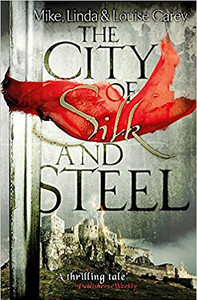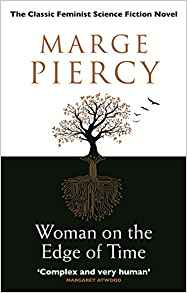This article contains Amazon affiliate links, if you click on the title of the book it will take you to Amazon if you then make a purchase we get a small commission but you don't get charged any extra.
I think I first started this conversation at a British Fantasy Society social in London, but it is one I have mulled over a fair bit since then - What is a Feminist Utopia? By which I mean what would society look like if feminism reached its end goals. There are lots of idealistic answers talking of equality and respect and freedom from the patriarchy, but this rhetoric is often light on actual details. Through fantasy and other related genres we can explore to world of make believe, of "what ifs" and while there are many feminist takes, do any of them really cover what the ideal world would look like for women?
A feminist fantasy may take a female protagonist, give agency and expression to that character, even if society isn't itself free from bias. A really interesting novel with this approach is And I Darken by Kiersten White. This takes a historical character, Vlad the Impaler, and tells the story of their early life, but gender flipped so the character is female. Lada Dracul sees the biases in her society, but ignores them by being cunning and ruthless and ultimately choosing her own path. This narrative is very powerful, reshaping traditionally male attributes in a female character. When we live in a patriarchal world, these tales are inspiring for individuals who seek to overcome their own battles. Great though these are, they can't by called a utopia as society as a whole has not changed only an individual's path.
This is a link to my review of And I Darken.
This can be extended then to societies which are mainly female orientated, perhaps the world out there is patriarchal, but women can create their own pocket-sized utopia. Perhaps this approach can be seen in tales using an Amazonian archetype, the society of woman given achievements in traditionally male areas, they are strong, warlike fighters. They have no need for men because they out perform them in the physical arena.
A variety of female orientated societies are explored in The City of Silk and Steel by Mike, Linda and Louise Carey. As the story develops you can see the strengths and weaknesses of different approaches, competing with men on their terms or celebrating the strengths of womanhood. However the city of women is only achieved by excluding or tightly controlling the role of men and the outside world continues with the biases we are familiar with.
Here is a link to my review of City of Silk and Steel.
So what about a larger society, rather than small pocket, where women are able to physically dominate men and so be the dominant gender. This is the premise of Naomi Alderman's novel The Power. The dynamics of a gender based society are completely reversed, gender is just as important, or perhaps even more so, but the power is on the hands of the women not the men. However, as this is still a biased approach, women and men are not equal and while this is likely to appeal to some feminists, I'm not sure it would be accepted by all feminists as a utopia.
Marge Piercy in her novel Woman on the Edge of Time sets out a genderless society, where childbirth is all arranged by technology rather than biology, you can have implants to allow breast feeding and relationships are defined by feelings rather than gender. Ignoring for a moment that there are some serious flaws in the society as depicted, that don't relate to the question of gender, for more details see my review. This could be a feminist utopia and I am sure it was written with that intention, but I have some feelings on this that I can't quite resolve. There is something really lovely found in the support and fellowship of other woman, something great about celebrating womenhood and all that is stripped from this vision of the future. Is it that this celebration is only relevant in the context of social oppression?
This is a link to my review of Woman on the Edge of Time.
Paulo Freire sets out in his book Pedagogy of the Oppressed that we hold tight to our identity, our culture, if living in a time or place when those difference are being criticised. We are contrary creatures, that if you point out our differences, we celebrate them rather than trying to blend in and so escape the associated persecution.
I feel that with our understanding of gender moving more clearly to being an expression of how you identify rather than arrangements of sexual organs, it becomes even more important to celebrate the inclusive qualities that make us women. By which I don't mean that we exclude people not assigned female at birth or men who have stereotypically female qualities, I mean that we celebrate those characteristics where ever we find them.
So if a feminist utopia is one where you can celebrate womanhood without oppressing others, what does that look like?
For me, I would want a society where we have equality, but not by losing our identity or competing with men in area where they have a biological advantage, but by valuing traditionally feminine attributes in the same way that we value traditionally masculine attributes. Where expressing emotion is considered healthy rather than weak or unprofessional. Where the empathetic, caring, nurturing, support role is paid the same as the authoritarian leader. Where being assertive is celebrated equally with quietly coming up with a creative plan. The PA is paid the same as the CEO. By which I don't mean that we should be in a communist style state where everyone is paid the same, but that the value of the work or project should be reflected in rewarding all of the people equally (or at least in hours worked) rather than valuing team members differently depending on the nature of their role.
I'm not sure I can call to mind a novel that explores this further, but if anyone knows of one I would love to hear about it in the comments below.











Comments